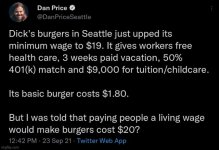@Chomsky (sorry for the formatting mess)
Encourage, 'yes'. Force, 'no'.
This is a good general principle. Force is for when incentives have failed, and a clearly ill-intentioned player is opposing government. The carrot should never fall from our hands ...
Especially as one grows older, there is more desirability for the comfort & security that only ownership can provide. I would not take that away from anyone.
Initially I was thinking of a private sector product, "live in your own home forever" which would provide a nice income stream in addition to Ownership For Life. The only losers would be those looking to inherit.
But for one thing, it needs an option triggered by the owner's choices. For instance, when one of them dies their partner may want to live anywhere BUT the big house full of memories. There's also the case where one or both move to supported accommodation or a nursing home.
Ultimately, I think it would have to be a government package. There's so much potential for information-disparity abuse.
I get your sentiments, but I can't say I'm ready to cross-the-line to the solution you propose (excess capital & property relinquished to the state). In fact, I abhor that idea. My desire would be to better attack this on fostering better opportunities for everyone to generate income, rather than re-distribute income of the more fortunate.
You're willing to re-distribute INCOME though? This isn't some "trickle down" nonsense which has baffled the voters while wealth disparity has doubled?
Inheritance is fundamentally an act of wealth being converted to income. The heir obtains it as income, and their decision whether or not to retain it as wealth comes after that. I am opposed to both, and with the vast amounts held as residential real-estate, there has never been a better time to intervene at the income stage.
You've definitely hit on a salient point I've hammered upon for years here, though: It is an inherent feature (flaw?) of capitalism, that the amassing of capital allows the possessor of the capital to generate further capital in excess of the labours of those that do not have capital!
That above in italics, is the root of our excess economic disparities, as I believe you understand as indicated by your 'abandonment' proposal.
Residential housing isn't the best example, since it has "productive" value for months or years at a time without workers contributing. But it still fits inside the bracket "capital used to generate excess wealth."
Well, residential housing IS a productive asset, though hardly a typical one, and if I could ease your mind that old people won't be talked into financial arrangement that make them feel uneasy, but instead give them the best of both worlds (choice of a home, but a better income stream), it might all be worth it to keep middle aged punks who never did anything much for their ancestor, suddenly becoming millionaires. Or even part millionaires. It's market irrationality, and with each transfer of money, widens the gap between rich and poor.
In closing, as I earlier stated, my proposal would be to primarily address the disparity on the income side, rather than accumulated wealth re-distribution. I think much of this can be done through the tax code. At the least, it would be a good start.
Thanks for the thoughtful reply.
The time to address the wealth disparity on the income side, was decades ago. The poor now, don't just have no money, they have debts (housing, auto, college) and enhancing their income would serve banks just as much as the debt holders.
Of course there's nothing wrong with more progressive taxation, or even just fiddling with Income Tax while eliminating regressive taxation (like FICA) but look out. The old lady who never talks is loading up her cat cannon ...
State taxes can be quite regressive (particularly sales) but even worse are the local taxes which fund schools and (sometimes) police. They're
meta regressive, as the impoverished areas that need the most, can least afford to pay their taxes.
Sigh. I have no problem with more progressive taxes, but they're not going to solve the problem, which is income being converted to wealth, for the few, while most of us have nothing left after a paycheck, to invest.

